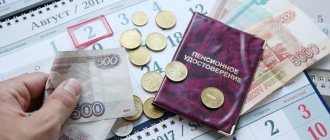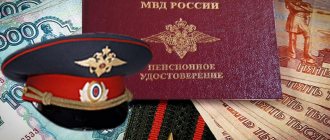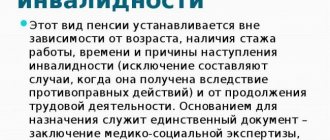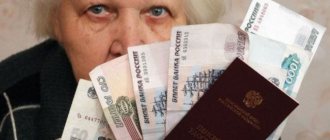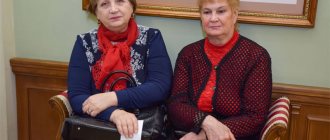What types of pensions exist according to the legislation of the Russian Federation?
Our country provides several options for pension provision. These payments are intended to compensate the recipient for the income he had during his working life or to support socially vulnerable members of society (disabled people, orphans, etc.). The table shows the classification of this type of government subsidy according to Russian legislation:
| Types of pensions | |||
| For compulsory pension insurance | For state support | For non-state support (voluntary) | |
| Insurance | Cumulative | ||
Existing options:
| Not subdivided | The categories provided by law are:
| No categories |
State pension provision
This form is regulated by the Federal Law “On State Pension Security in the Russian Federation” dated December 15, 2001 No. 166-FZ. The measures reflected in it were developed and adopted with the aim of:
- compensate citizens for earnings (income) that are lost due to termination of the state civil service upon reaching length of service upon retirement from an old-age insurance pension;
- compensate the earnings of citizens who were cosmonauts and were part of the flight test crew;
- compensate for damage to health caused during military service, man-made and radiation disasters, in case of disability or loss of a breadwinner;
- ensuring the existence of disabled citizens.
According to Article 5 of the above-mentioned legal act, the following types of pensions are distinguished:
- for length of service;
- by old age;
- on disability;
- in case of loss of a breadwinner;
- social pensions.
Unlike compulsory pension insurance, with state pension provision the insurance period does not matter. Payments of this type are financed by the federal budget and are due only to strictly defined by law categories of entities that are not insured and are not subject to compulsory insurance as such.
State pensions
The form of pension provision under consideration is aimed at compensating lost income for the following categories of citizens:
- civil servants;
- military personnel;
- WWII participants;
- citizens who survived the siege of Leningrad;
- victims of radiation;
- astronauts;
- test pilots;
- disabled citizens.
These payments are financed from the federal budget and are assigned depending on certain conditions (developing the required length of service, lack of other income, etc.).
Social pensions for disabled citizens
For those who cannot earn the right to an insurance pension, social pension payments are established in accordance with the provisions of Law No. 166-FZ of December 15, 2001 “On state pension provision in the Russian Federation”.
They are paid to disabled citizens: disabled people of all groups, including disabled children. The size of the payment depends on the category of the recipient. This type of pension is assigned from the date the person applying for it is declared incapacitated. At the same time, there are no requirements regarding insurance length and pension points.
Social pensions established for disabled citizens are of three types:
- by old age;
- on disability;
- on the occasion of the loss of a breadwinner.
Citizens who apply for this pension must permanently reside in the territory of the Russian Federation and belong to the category of disabled people. This type of pension provision is financed from the state budget.
Pensions for civil servants, military personnel and certain categories of citizens
These categories of citizens can be provided with one of four types of state pensions:
- for length of service;
- by old age;
- on disability;
- on the occasion of the loss of a breadwinner.
An application for the appointment of such a pension payment can be submitted at any time after the right to it arises to the Pension Fund of the Russian Federation at the place of residence or to the MFC. Federal civil servants submit an application for a long-service pension to the personnel service of the government agency where they held the position before dismissal.
Due to the specific nature of the service, for some civil servants, pension payments are established by the relevant government department.
State long service pensions
Such pension payments are assigned to the following categories of citizens:
- state employees with 15 years of civil service;
- military personnel in accordance with the provisions of the law of February 12, 1993;
- cosmonauts with 25 years of experience in the relevant positions for men and 20 years for women, if 10 years of them for men and 7.5 for women are spent working in flight test crews;
- test pilots with 25 years of experience in the relevant positions for men and 20 years for women, if two thirds of them worked as flight personnel.
It is worth noting that these individuals may be entitled to two pensions if they have the right to do so: one for length of service, the other - an old-age insurance pension (more precisely, its share).
State old age pension
This pension payment is assigned to citizens affected by radiation. The conditions for the emergence of the right to it, as well as the size, depend on the category of the citizen, the work he performs, and the place and duration of residence in the contaminated territory.
The state old-age pension can be assigned according to two laws:
- if you have 5 years of insurance experience in accordance with Law No. 166-FZ of December 15, 2001;
- with 15 years of experience and 30 points in accordance with Law No. 1244-1 of May 15, 1991.
State disability pension
The size of this pension payment also depends on the category of recipient, which includes:
- WWII participants and veterans;
- residents of besieged Leningrad who became disabled;
- military personnel who became disabled due to illness or injury during conscription service;
- citizens who became disabled as a result of the Chernobyl accident;
- cosmonauts who became disabled while preparing for or performing a space flight.
The performance of work does not affect this payment. The amount of pension provision is calculated as a percentage of the size of the social pension.
State survivor's pension
This pension payment is established in the event of the death of a military personnel serving on conscription, citizens exposed to radiation, astronauts and candidates for them.
Disabled members of their family, primarily children under 18 years of age, parents and spouses, have the right to a state pension under the SPC. The amount of compensation depends on the category of the recipient.
Pension payments to family members of a deceased serviceman who served under conscription are paid in full, regardless of the fact of work.
Types of state pensions
State pension provision is provided as compensation for earnings in connection with the end of military or civil service, the loss of a breadwinner, for the disabled or citizens who lost their health in military service or as a result of radiation disasters. The source of their financing is the federal budget.
Includes the following types of state pensions:
For length of service
Appointed to military personnel, civil servants, astronauts and flight test personnel with minimum length of service requirements.
For example, for flight test personnel, the right will be exercised upon completion of 25 years of flight experience for men and 20 years of flight experience for women. And in case of premature leaving work due to health conditions, the minimum required flight experience is reduced by 5 years.
By old age
Entitled to citizens affected by radiation disasters upon reaching the required age and status of the victim, which is established depending on the type of work performed, its location and duration.
For example, a woman born in 1968 who received radiation sickness at the Chernobyl Nuclear Power Plant will be able to exercise her right to a state pension at the age of 50 if she has five years of experience.
By disability
Entitled only to certain categories of citizens upon the onset of disability, regardless of the fact of continued work.
For example, a disabled person of group 2 due to a military injury, regardless of age, will be paid a state disability pension.
On the occasion of the loss of a breadwinner
Provided for family members (disabled) of deceased or killed military personnel, astronauts, and citizens affected by radiation disasters.
For example, a minor child of a serviceman who died due to a military injury will be assigned a state pension under the SPC until his 18th birthday. And in the case of full-time education, it will be extended to 23 years.
Social pension
It is paid to citizens without presenting requirements for insurance (work) experience. However, subject to permanent residence in Russia. The size of the social pension varies depending on the category of the applicant and is established by the state (types of social pensions: old age, disability, loss of a breadwinner).
Example: To qualify for an old-age social pension, a non-working man only needs to be 60 years old.
State pension
The legislation establishes the grounds for receiving this type of social assistance. The recipient must:
- Refers to the list of persons entitled to receive a pension under the state pension provision (for example, to be a military personnel or participant in the Great Patriotic War).
- Have the appropriate evidence (for example, federal civil servants are entitled to a pension upon reaching a certain length of service).
The specifics of the purpose of this type of social benefits are discussed in Articles 4 and 5 of Federal Law No. 166 “On State Pension Security” of December 15, 2001. It provides the conditions for appointment and categories of citizens entitled to receive such a pension. The table shows how, depending on the specific type of social benefit, the circle of persons to whom it can be issued changes:
| Types of pensions for state pension provision | To whom is it provided? |
| For length of service | Federal officials, military personnel, cosmonauts and test pilots - when developing the statutory length of service for a given position. |
| By old age | For victims of radiation/man-made disasters - upon reaching the age of retirement. |
| For the loss of a breadwinner | For family members of military personnel, cosmonauts and those killed during the liquidation of the consequences of the Chernobyl nuclear power plant accident - in the event of the death of the specified person and the presence of dependents. |
| Social pension | Disabled citizens. This security is assigned to persons who, for various reasons, have not received the right to a labor pension. It happens due to old age, disability and loss of a breadwinner. |
| By disability | Participants of the Great Patriotic War, residents of besieged Leningrad, cosmonauts, liquidators, military personnel - in case of injury that resulted in physical limitations. |
Types of pensions in Russia and conditions for their assignment
An old-age labor pension for some professional and social categories of citizens may be assigned before reaching the generally established retirement age. The right to early retirement is available to doctors, teachers, civil aviation flight personnel, miners, citizens who have worked in the Far North for at least 15 years, women who have given birth to five or more children and some other categories of citizens. A labor disability pension is established for citizens recognized in the prescribed manner as disabled people of groups I, II, III. The pension is assigned based on the disability group, regardless of the degree of limitation of the disabled person’s ability to work.
The right to a labor pension in the event of the loss of a breadwinner is available to disabled family members of the deceased breadwinner who were dependent on him (with the exception of persons who committed an intentional criminal act that resulted in the death of the breadwinner and was established in court).
Disabled family members are recognized as: children of the breadwinner who have not reached the age of 18, students studying full-time - until they graduate from university or until they reach the age of 23; parents and spouse of the deceased breadwinner, if they have reached retirement age or are disabled.
One of the parents or spouse of the deceased breadwinner is also entitled to receive a labor pension for the loss of a breadwinner, regardless of age and ability to work, if they are caring for children, brothers, sisters or grandchildren of the deceased breadwinner who are under 14 years of age.
Adoptive parents have the right to a labor pension in the event of the loss of a breadwinner on an equal basis with their parents, and adopted children - on an equal basis with their own children.
State pension pension (state pension) is a monthly state cash payment that is provided to citizens in order to compensate them for earnings lost in connection with the termination of the federal state civil service upon reaching the length of service established by law when entering an old-age (disability) pension; in order to compensate for lost earnings of citizens from among the cosmonauts and flight test personnel in connection with retirement for length of service.
The state pension is paid in order to compensate for damage caused to the health of citizens during military service, as a result of radiation or man-made disasters, in the event of disability or loss of a breadwinner, upon reaching the legal age; or disabled citizens in order to provide them with a means of subsistence.
There are five types of state pensions: long-service pension; old age pension; disability pension; survivor's pension; social pension (old age, disability, loss of breadwinner).
Federal civil servants have the right to receive a state long-service pension if they have at least 15 years of service; military personnel (with the exception of citizens who served in conscription); cosmonauts and flight test personnel with at least 25 years of service for men and 20 years for women.
Citizens who have suffered as a result of radiation or man-made disasters have the right to receive a state old-age pension.
Military personnel, citizens who suffered as a result of radiation or man-made disasters, participants in the Great Patriotic War, citizens awarded the “Resident of Siege Leningrad” badge, and cosmonauts have the right to receive a state disability pension.
The state disability pension is paid in the event of disability occurring during conscription or no later than three months after dismissal from military service. Also, a disability pension, regardless of the length of work experience, is assigned to citizens who became disabled as a result of the Chernobyl disaster.
Disabled family members of fallen (deceased) military personnel, citizens injured as a result of radiation or man-made disasters, and citizens from among the astronauts have the right to receive a state pension in the event of the loss of a breadwinner.
The following categories of disabled citizens have the right to receive a social pension: disabled people of groups I, II and III; disabled children; children under the age of 18, as well as full-time students in basic educational programs until they complete their studies or until they reach the age of 23, who have lost one or both parents; citizens from among the indigenous peoples of the North who have reached the ages of 55 and 50 years (men and women, respectively); citizens who have reached the ages of 65 and 60 years (men and women, respectively).
Citizens who simultaneously have the right to various pensions in accordance with the legislation of the Russian Federation are assigned one pension of their choice, unless otherwise provided by federal law.
The right to simultaneously receive two pensions is granted to citizens who have become disabled as a result of a military injury; participants of the Great Patriotic War; parents and widows (who have not remarried) of military personnel who died (died) during military service, citizens awarded the badge “Resident of besieged Leningrad”; family members of deceased (deceased) citizens among the astronauts.
The material was prepared based on information from open sources
Social payments at the expense of the Pension Fund
Under certain preferential circumstances, citizens receive the right to the following payments from the Pension Fund:
- Social supplement. This is an addition to the pension amounts of disabled people whose income is below the subsistence level in the region.
- Monthly payments. Honored citizens have the right to them, for example, heroes of the USSR or the Russian Federation, minor prisoners of concentration camps in the past, and others.
- A set of social services is provided to pensioners without a request. It includes compensation for costs of transportation, sanatorium treatment, and the purchase of medicines.
- An additional monthly payment in the amount of one thousand rubles is awarded to disabled people and participants in military operations during the Second World War, and prisoners of concentration camps; at 500 rub. other categories of persons who took part in the events of the Second World War.
- Former pilots and coal industry workers receive a separate supplement to their pension accruals.
- Small money (1200 rubles) is paid to able-bodied people caring for group 1 disabled people and disabled children. In addition, such an allowance is established for those who look after pensioners who have crossed the 80-year-old threshold.
- Funeral benefit. Appointed upon application to compensate for funeral expenses of a pensioner who received social benefits from the Pension Fund.
- Maternity capital is assigned after the birth of the second and subsequent children, if their date of birth fell between 01/01/2007 and 12/31/2018.
Attention: you can apply for any of these payments only if you have evidence of belonging to a preferential category of citizens
Important! Compensation for caring for a disabled child provided by one of the parents is 5,500 rubles. From July 2019 it has been increased to 10,000 rubles
From July 2021 it has been increased to 10,000 rubles
Important! Compensation for caring for a disabled child provided by one of the parents is 5,500 rubles. From July 2019 it has been increased to 10,000 rubles
State old age pension
This subsidy is provided for people affected by radiation and man-made disasters. This includes those who worked, liquidated, and lived in the radiation exposure zone.
The conditions for assigning this financial assistance are different. Let's consider them depending on the gradation provided by law:
| Category of people | Male retirement age | Retirement age for women |
| Liquidators of the Chernobyl accident in 1986-87. Evacuees from the affected area. Disabled people due to the Chernobyl disaster | 50 | 45 |
| Liquidators of the Chernobyl accident in 1988-90. Those who have suffered from radiation or other illness associated with exposure to radiation during the Chernobyl disaster itself or its liquidation. Workers in the exclusion zone. Disabled people due to the Chernobyl disaster | 55 | 50 |
| IDPs from the radiation zone. Residents of the radiation zone before migration. Workers in this zone, but not living there | 3 years earlier than the old age pension age. Also for each year lived or worked minus 6 months, but in total no more than 7 years | 3 years earlier than the old age pension age. Also for each year lived or worked minus 6 months, but in total no more than 7 years |
| Residents of the zone with the right to migrate. Those who voluntarily moved from this zone | 2 years earlier than the old age pension age. Also, for every 3 years lived or worked in such a zone, one year minus 12 months, but in total no more than 5 years | the same |
| Residents of an area with preferential social benefits. economic status | 12 months earlier than the old age pension age. Also, for every 4 years lived or worked in such a zone, one year minus 12 months, but in total no more than 3 years | the same |
| Disabled people as a result of similar disasters, but not Chernobyl | According to regulations developed for this category of citizens. | the same |
The condition of having work experience must also be met, referring to the law:
- No. 166-ФЗ dated December 15, 2001 – from 5 years;
- No. 1244-1 of May 15, 1991 + norms 400-FZ of December 28, 2013. – 15 years of experience and 30 pension points. At the same time, there is a gradual increase in length of service from 2015 to 2024, from 6 years to 15 years, respectively. Pension points also increase gradually from 2015 to 2025, by adding 6.6 points to the indicator. 2.4 b. annually.
The benefit is issued for an indefinite period, is assigned from the 1st day of the month of application, and is paid monthly.
The amount of state support for victims and liquidators of the disaster is 250% of the social security amount. pensions; for residents and workers of the irradiated area – 200%; for a disabled dependent in the family - an additional payment of 1208.90 rubles, but not more than for three.
For residents of the Far North and equivalent areas, the amount of the subsidy is calculated by adding the regional coefficient.
The difference between a social old-age pension and an insurance pension
In 2018, not much is required to receive an old-age insurance pension in Russia. Those who reached retirement age this year (women born in 1963 and men born in 1958) must also have:
- minimum 9 years of insurance experience,
- minimum 13.8 pension points.
In addition to work experience, the insurance period also includes some other periods of a person’s life, including military service, being on maternity leave, etc.
A social old-age pension is received by those who have not reached the above minimum by a certain age in terms of length of service and the number of pension points earned.
It is worth keeping in mind that the retirement age for those receiving a social pension is five years higher than for everyone else. In 2018 this is:
- 60 years - for women,
- 65 years old - for men.
Since the citizen, by the time he reaches the generally accepted retirement age, has not contributed enough funds to the budget of the country's Pension Fund, the state agrees to begin paying him a pension only after five years. During this time, a person also has the opportunity to earn the required minimum length of service and pension points. If the minimum is reached within these five years, the citizen will have a basis for receiving an insurance pension.
Another nuance that you need to know about is that since the beginning of 2015, the rules for assigning social old-age pensions in Russia have changed slightly. Now foreign citizens and stateless persons can receive Russian social pensions only if they prove that they have lived in Russia for at least 15 years.
Old age pension in 2021: size and latest changes
Amount of social pension in 2021
The minimum social pension in the Federation is 9,850 rubles and above. Each category of citizens receives a different amount, and sometimes it differs by almost two times:
- Citizens living in the North who have already reached the retirement age of fifty and fifty-five years receive 4,959.85 rubles every month. Citizens who are already sixty and sixty-five years old. Disabled people of the second group and children who have lost one parent, have not reached the age of majority or have reached the age of twenty-three, but are studying full-time in educational institutions;
- People who became disabled in childhood and have group 1 receive a social pension in the amount of 14,600 rubles and more. Disabled children also receive such a pension;
- The average social pension for disabled children is 14,500 rubles;
- All disabled people of group 3 are entitled to a pension of 4,805.69 rubles.
Formula for calculating the social type of pension
At the beginning of April 2021, a revision of the amount of social payments and pensions to citizens of the Russian Federation took place. So, on average across the country, the amount increased by 4%.
A detailed calculation of the amount of social payments depends on some individual characteristics of the citizens’ residence, namely: if a pensioner moves from an area where the pension is calculated according to the regional coefficient, then the pension amount is recalculated according to the conditions of the region where the pensioner moved.
Pension increases in Russia are provided twice a year. Usually these are two dates: April 1 and February 1. Additional measures may also be introduced to increase payment amounts if inflation in the country exceeds a pre-calculated level.
For the social type of pension payments, formulas and calculations for them are not applied, since very often citizens of the Russian Federation do not have work experience and do not have the opportunity due to disability, minor age, employment while acquiring a profession, or for other reasons specified in the Legislation to obtain it. So they do not make deductions to funds from wages in the absence of wages.
Therefore, when receiving a social pension, government agencies assign fixed amounts that citizens receive monthly, in accordance with a certain category and taking into account the cost of living in the country.
Average social pension size
Social pension amount
| Year: | Sum: |
| 2012 | 4900 rubles and above |
| 2013 | 5700 rubles and above |
| 2014 | 6900 rubles and above |
| 2015 | 8100 rubles and above |
| 2016 | 12259 rubles and above |
Found an error? Select it and press Ctrl + Enter.
Amount of fixed payment to the insurance pension
As of the end of 2021, the fixed pension payment is equal to 4805.11 rubles, which are accrued every month. This amount can be increased if the pensioner is included in the preferential list - then, depending on the category, the amount of the additional payment will be 6246.64-21622.99 rubles. The table shows the categories of citizens who have the right to a monthly fixed payment:
| Category of citizens | Monthly payment amount, rubles | |
| Having no dependents - citizens over 80 years of age or disabled people of the first group | 9610,22 | |
| Citizens of the same category with 1-2-3 dependents | 11211,92-12813,62-14415,32 | |
| Citizens under 80 years of age who do not have a disability of the first group and have 1-2-3 dependents | 6406,81-8008,51-9610,21 | |
| Residents of the Far North (and areas that are equivalent to it) | When using the increasing coefficient, the pension will increase by the specified amount | |
| Citizens, having worked for 15 or more years in the regions of the Far North, and having a work experience for men of 25 years or more, for women 5 years less. | Persons without dependents under 80 years of age and in the absence of disability of the first group | 6246,64 |
| Persons over 80 years of age who have no dependents or have a disability of the first group | 12493,28 | |
| Persons with 1-2-3 dependents under 80 years of age and in the absence of disability of the first group | 8328,85-10411,06-12493,27 | |
| Persons with 1-2-3 dependents over 80 years of age or if there is a disability of the first group | 14575,49-16657,70-18739,91 | |
| Citizens, having worked for 20 or more years in the regions of the Far North, and having a work experience for men of 25 years or more, for women 5 years less. | Persons without dependents under 80 years of age and in the absence of disability of the first group | 7207,67 |
| Persons over 80 years of age who have no dependents or have a disability of the first group | 14415,34 | |
| Persons with 1-2-3 dependents under 80 years of age and in the absence of disability of the first group | 9610,22-12012,77-14415,32 | |
| Persons with 1-2-3 dependents over 80 years of age or if there is a disability of the first group | 16817,89-19220,44-21622,99 | |
- Symptoms of sunstroke in adults
- How to toilet train a puppy in an apartment
- Sauerkraut recipe with photo
What is a funded pension?
Accumulative pension provision is a type of subsidy formed on the basis of monthly contributions from the employer, provided that the citizen works officially. Until the beginning of 2021, it was possible to choose this form of benefit and transfer funds from maternity capital.
The formation of the size of the life annuity depended on the volume of payments and income from investment activities. The funded option was only available to individuals born before 1967 and who made this choice before the end of the year 15.
People born in 1966 and older also have savings that were deducted in the period 2002-2004. However, since 2005, these contributions have been suspended on the basis of changes made to the Legislation of the Russian Federation.
Payments are made on a voluntary basis as part of participation in the co-financing program and through the formation of family capital. The employer pays contributions from employed citizens to the Pension Fund, but they go to the account only to the compulsory security insurance fund.
Please note: the law establishes the right to receive benefits in person or through a person authorized by a power of attorney. Documents can be issued for any period. If the time is not specified, the validity period is 12 months.
If an application is received from a worker to refuse the formation of the funded part of the benefit, all previously received funds will be retained. However, a person will not be able to withdraw them from the fund before reaching a specified age. Payments made will also be invested and increased.
After retirement, a citizen is required to submit an application and go through the procedure for assigning financial support. The legislation also provides for the possibility of independently disposing of funds, i.e., choosing an insurance organization.
In addition to the mandatory funded part, there is a voluntary type of non-state benefit. These subsidies are formed on the basis of personal contributions to the NPF in accordance with the concluded agreement between the parties. Contributions can also be made by the employer, but in this case the benefit takes corporate form.
For your information: representatives of a number of professions have the opportunity to receive several benefits at a time - the state (for length of service) and the insurance part of the provision (when entering a well-deserved retirement).
Funded pension
This is a monthly lifetime payment of pension savings formed from insurance contributions from employers and income from their investment. A funded pension can be formed for citizens born in 1967 and younger if a choice was made in its favor before the end of 2015.
Citizens born in 1966 and older (men born in 1953-1966 and women born in 1957-1966 also have pension savings, in whose favor insurance contributions for a funded pension were paid from 2002 to 2004 inclusive. Since 2005 years, these contributions were stopped due to changes in legislation), the formation of pension savings can only occur through voluntary contributions within the framework of the State Co-financing Program for Pension Savings, as well as through the allocation of maternity (family) capital funds to a funded pension. If a citizen works, insurance contributions for compulsory pension insurance are directed only to the formation of an insurance pension.
In case of refusal to form a funded pension, all previously formed pension savings of citizens are preserved: they continue to be invested and will be paid in full when citizens receive the right to retire and apply for it. In addition, insured persons still have the right to manage their pension savings and choose who to entrust their management to.
Pension payments from non-state sources
In addition to state pension payments, Russian citizens have the right to another type of pension in the Russian Federation - placement of the funded part of the pension in non-state pension insurance funds. A funded pension and an insurance pension in the Russian Federation must be distinguished. This method of pension provision helps the citizen to form a certain part of the payments as another additional pension. In order to receive such payments, you must enter into an agreement with any non-state pension fund and pay contributions within a specified period of time. In this case, the source of financing may be the citizen’s personal funds deposited into a personal individual pension account, as well as in favor of other persons.
Contributions can also be made by employers on behalf of their employees. In addition, such payments are the fund's income from invested funds. A non-state pension can be assigned if the citizen has the right to receive an insurance pension. These payments can be established for an indefinite period, or they can be made over several years, it depends on the conditions specified in the contract. Different funds offer different programs for forming the funded part of a pension.
In conclusion, it should be added that the minimum pension in the Russian Federation is guaranteed to almost all categories of citizens.
Non-state payments
The above types of pensions in the Russian Federation do not constitute an exhaustive list of possible financial support. Citizens can receive payments by concluding an agreement with a private organization.
A common way to provide for yourself in case of disability is an agreement concluded with a non-state pension fund. Participants make regular contributions to the organization, and the latter, in turn, invests the contributions. Profits are distributed equally among NPF members. Moreover, the age at which participants begin to receive pension payments is determined not by law, but by contract.
An alternative solution is life insurance. Organizations also function by investing contributions from members. At the end of the contract, the person receives the insurance amount, and in the event of his death, the funds are transferred to his heirs.
Amount of payments for compulsory pension insurance
The pensioner has the right to choose to form exclusively the insurance part or to divide contributions into two components, when one is made to the savings fund, and the second is fixed. A citizen can make a decision about this only in the first five years of work experience.
The legislation of the Russian Federation established the obligation for the employer to make monthly contributions in the amount of 22% of the employee’s salary. The distribution of pension payments in the account in the Pension Fund of the Russian Federation depends on which method of pension payments a person has chosen. Namely:
- If contributions are transferred only to the insurance part of the subsidies, then 6% goes to the basic part and 16% to the benefit;
- When accumulation occurs on both parts, then 6% is allocated to the basic and funded parts, and 10% to the insurance account.
For 2021, the moratorium on the transfer of contributions to the funded part from the Pension Fund remains valid. However, citizens were left with the right to act independently:
- act on the basis of a co-financing program;
- use maternity capital to form an insurance pension.
At the same time, all employers are responsible for ensuring accurate pension payments. Violation of the rules is punishable by law.
Insurance
The insurance type of pension in Russia is a mandatory form of contributions for the entire population of the country. Thus, compensation occurs for the income part of the life of people who previously received wages when they enter a well-deserved retirement or in the event of loss of legal capacity.
Payments are recognized as a guarantor of financial protection in relation to minor children and disabled citizens, including the loss of a breadwinner.
At this time, the current tariff rate is 22% of the salary. When calculating, the following parts are used, into which the percentage is conventionally divided:
- Individual tariff of 16%. This rate can be divided into two parts - 10% insurance coverage, 6% - the savings part;
- The Solidarity tariff has a fixed rate of 6%, which is transferred to the Pension Fund for future provision of old age.
In accordance with the current legislation and the new pension reform, contributions received into the account are converted into points (IPC). Every year, these funds are indexed to ensure that a person receives a decent benefit after retirement.
Old age benefit
In accordance with the Federal Law, this form of pension assignment requires the occurrence of the following factors:
- having a minimum insurance period;
- the appropriate age for retirement;
- retirement earlier than the established period due to legal circumstances;
- the required number of IPCs has accumulated in the account.
Note: to retire, a man must be 60 years old; for women, this right begins at 55 years old.
Provision in the presence of a disability group
Disability benefits mean that for a person in this status, the number of IPCs in the account does not matter. That is, he receives legal payments based on compulsory insurance coverage.
To assign contributions to the recipient, a citizen must fulfill two conditions:
- have a medical examination confirming the assignment of a disability group;
- having even a short work experience.
It is noteworthy that this right comes when a person has worked for one day. Legislative regulations recognize such a person as disabled and assign a subsidy, regardless of the circumstances of receiving the group.
Survivor's benefit
Federal Bill No. dated December 28, 2013 spells out the conditions for assigning this type of pension. Current regulations give the right to receive government support in the event of the loss of a breadwinner. However, to apply for a subsidy, the following conditions must be met:
- the deceased person must be in the status of a breadwinner and have work experience at the time of his life;
- the death should not occur due to the actions of dependents.
A complete list of persons entitled to receive state support can be found in Article 10 of this law.
Please note: payments in respect of minor dependents are made until they reach the age of 18 or after completing full-time education in institutions of the Russian Federation. Subsidies are paid every month. Download for viewing and printing:
Who is entitled to old age insurance pensions?
The legislation clearly defines the persons who can receive pension payments. These people can be divided into the following categories:
- Citizens of Russia: women at least 55 years old, men – 60 years old, with an established amount of insurance coverage.
- Citizens of Russia who are in the civil service: - from January 1, 2017, an increasing coefficient will be introduced - annually the retirement age for this category will increase by six months (with a “ceiling” of 63 and 65 years for women/men). For this category, the old-age pension in 2018 is intended for women who have reached 56 years of age, and for men - 61 years of age.
- Citizens of Russia who have worked in the northern territories (and equivalent areas) for at least 15 years: women at least 50 years old, men - 55 years old.
- Foreign citizens: women at least 60 years old, men – 65 years old, with Russian work experience of at least 15 years.
To calculate payments, the Pension Fund has special formulas that take into account age, length of service and other indicators. It is important that work experience also includes time spent studying at a higher educational institution or military service. Working in hazardous conditions means early retirement (as a rule, the amount of payments in this case will be larger).
Conditions of receipt
The minimum length of service and the individual pensioner coefficient (IPC) are not constant values - until 2025, they will increase annually. Therefore, the requirements for those retiring in old age will change every year. The table shows this dynamics, according to the Law “On Insurance Pensions”:
| Year | Minimum work experience, years | Minimum IPC, points |
| 2017 | 8 | 11,4 |
| 2018 | 9 | 13,8 |
| 2019 | 10 | 16,2 |
| 2025 | 16 | 30 |
Mandatory pension insurance
An employee's right to a pension is determined by special contributions made from his salary. These contributions to the Pension Fund of Russia (PFR) are made by the enterprise's accounting department (but in some cases, for example, for individual entrepreneurs, private lawyers, farmers, the individual independently transfers the necessary funds).
The obligation to make contributions to the Pension Fund of the Russian Federation applies to both employed citizens of our country and to foreigners and stateless persons working here. All these employees are considered registered in the compulsory pension insurance system (MPI), therefore, in the event of an incident (injury, death, etc.), they themselves or their relatives will receive state social payments. The amount of contributions is 22% of the accrued salary. By default, these funds are distributed as follows:
- For the formation of an insurance (otherwise known as labor) pension – 16%.
- To create the savings part – 6%. This type of social security is not mandatory and can be waived by allocating all funds to the insurance portion.
The assignment of a labor pension to a specific person (or his dependents) requires the fulfillment of three conditions. These include:
- Mandatory registration of the employee in the OPS system. This is confirmed by the presence of a special certificate - the Insurance Number of an Individual Personal Account (SNILS).
- Availability of work experience. Depending on the type of pension, recipients are subject to different requirements for the duration of this period.
- The occurrence of an insured event (injury, reaching a specified age, the right to early receipt, etc.). Upon the death of the insured person, a pension is assigned to his disabled dependents (more on this below).
Labor pensions: concept and types
Labor pension
– a monthly cash payment in order to compensate citizens for wages or other income that the insured persons received before the establishment of their labor pension or that disabled family members of the insured persons lost due to the death of these persons; the right to receive a pension is determined in accordance with the conditions and standards established by law.
The following have the right to a labor pension:
- citizens of the Russian Federation insured in accordance with the Federal Law “On Compulsory Pension Insurance in the Russian Federation”;
- Disabled family members of insured citizens of the Russian Federation have the right to a labor pension in the event of the loss of a breadwinner. Disabled family members of a deceased breadwinner have the right to work if they were dependent on him. The family of an unknown breadwinner is equated to the family of a deceased breadwinner if the unknown absence of the breadwinner is certified in the prescribed manner;
- foreign citizens and stateless persons permanently residing in the Russian Federation, except for cases established by federal law or an international treaty of the Russian Federation.
The following types of labor pensions are established in the Russian Federation:
- old-age labor pension;
- disability labor pension;
- labor pension in case of loss of a breadwinner.
An old-age labor pension and a labor disability pension may consist of the following parts:
- base part;
- insurance part;
- storage part.
The labor pension in case of loss of a breadwinner consists of the following parts:
- base part;
- insurance part.
Citizens who for some reason do not have the right to a labor pension are provided with a social pension.
Citizens entitled to simultaneously receive various types of labor pensions are assigned one pension of their choice.
An application for a labor pension (part of a labor pension) can be made at any time after the right to a labor pension (part of a labor pension) arises, without any time limit.
Deductions from labor pensions are made based on:
- executive documents;
- decisions of bodies providing pension provision on the recovery of labor pensions overpaid to a pensioner in connection with a violation of clause 4 of Art. 23 of this Federal Law;
- court decisions on the recovery of labor pensions due to abuses on the part of a pensioner established in court. Deductions are made in an amount calculated from the amount of the established labor pension.
No more than 50% can be withheld, and in cases established by the legislation of the Russian Federation, no more than 70% of the labor pension. Deductions based on decisions of the bodies providing pensions are made in an amount not exceeding 20% of the labor pension.
In the event of termination of payment of a labor pension before full repayment of the debt on overpaid amounts of the said pension, withheld on the basis of decisions of the bodies providing pensions, the remaining debt is collected in court.
If not all parts of the labor pension have been established for a person, then deductions from the labor pension are made from the established parts of this pension.

